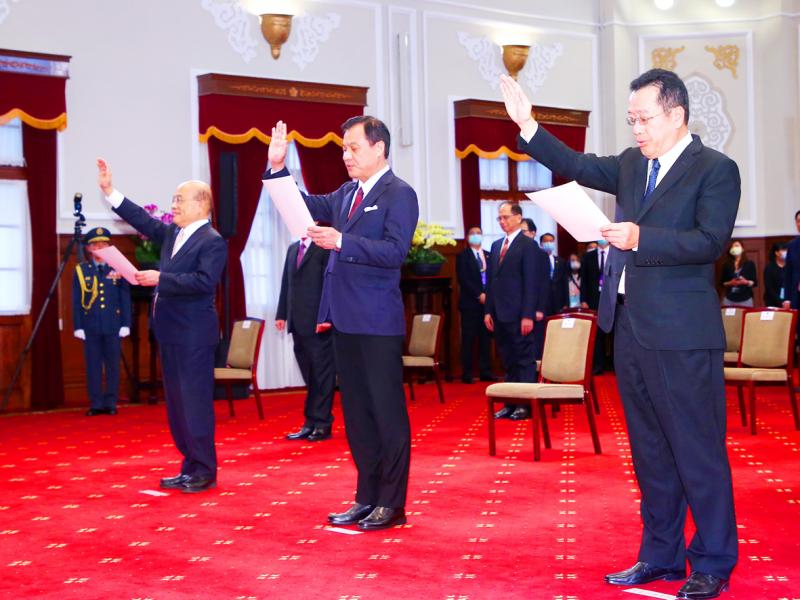Presidential Office Secretary-General Su Jia-chyuan (蘇嘉全) yesterday resigned after his nephew, Democratic Progressive Party (DPP) Legislator Su Chen-ching (蘇震清), was implicated in a bribery case related to a dispute over the ownership of Pacific Sogo Department Store (太平洋崇光百貨).
“I resigned from the post so that President Tsai Ing-wen (蔡英文) would not be bothered by it anymore, and the prosecutors can investigate the case in a fair and just manner. I thank President Tsai once again for supporting me. May the country continue to prosper under her leadership,” Su Jia-chyuan said in a statement.
The Presidential Office said that Tsai has accepted Su Jia-chyuan’s resignation, adding that Presidential Office deputy secretary-general Jason Liu (劉建忻) would serve as acting director-general.

Photo: CNA
The former Legislative Yuan speaker assumed the post at the Presidential Office when Tsai started her second term on May 20.
“I have been doing my job as a chief of staff at the Presidential Office with fear and trembling with the hope of sharing the burden borne by the president. However, all the mudslinging campaigns against me, as well as the scandal that involves my nephew, have caused trouble for the president. For this I am deeply sorry,” Su Jia-chyuan said in the statement.
He said that he has never “crossed the line” in his 30-year-long political career and has nothing to hide, adding that he and his wife have never been investigated or indicted in any corruption cases.
He also said that he would not accept an unsubstantiated and twisted allegation that he has abused his authority to benefit his relatives, adding that he would vigorously defend his innocence.
Taipei prosecutors on Saturday filed a motion to detain Su Chen-ching, along with four other former and incumbent lawmakers as part of an investigation into bribery allegations against six current and former legislators and their aides.
The court hearing on whether to grant the prosecutors’ request to detain them was ongoing as of press time last night.
The DPP’s anti-corruption committee convened a meeting at 8pm to discuss the penalties for Su Chen-ching and former legislator Mark Chen (陳唐山), who has also been implicated in the case and was released on NT$500,000 bail early on Saturday.
Based on the party’s anti-corruption guidelines, the committee would first investigate the charges against the two, and each would be given an opportunity to tell their side of the story.
The guidelines also stipulate that the committee can still make a decision even if it does not hear from Su Chen-ching, as long as half of the committee members are present.
“The case has entered legal proceedings. We hope that judicial institutions can quickly clarify the details so justice can be served,” the DPP said.
Political insiders in Pingtung County have said that Su Chen-ching, who has been a legislator since 2008, has been aggressively setting up his campaign to run for county commissioner in 2022.
His implication in the corruption scandal could severely disrupt his plan, they said.

CHAOS: Iranians took to the streets playing celebratory music after reports of Khamenei’s death on Saturday, while mourners also gathered in Tehran yesterday Iranian Supreme Leader Ayatollah Ali Khamenei was killed in a major attack on Iran launched by Israel and the US, throwing the future of the Islamic republic into doubt and raising the risk of regional instability. Iranian state television and the state-run IRNA news agency announced the 86-year-old’s death early yesterday. US President Donald Trump said it gave Iranians their “greatest chance” to “take back” their country. The announcements came after a joint US and Israeli aerial bombardment that targeted Iranian military and governmental sites. Trump said the “heavy and pinpoint bombing” would continue through the week or as long

TRUST: The KMT said it respected the US’ timing and considerations, and hoped it would continue to honor its commitments to helping Taiwan bolster its defenses and deterrence US President Donald Trump is delaying a multibillion-dollar arms sale to Taiwan to ensure his visit to Beijing is successful, a New York Times report said. The weapons sales package has stalled in the US Department of State, the report said, citing US officials it did not identify. The White House has told agencies not to push forward ahead of Trump’s meeting with Chinese President Xi Jinping (習近平), it said. The two last month held a phone call to discuss trade and geopolitical flashpoints ahead of the summit. Xi raised the Taiwan issue and urged the US to handle arms sales to

BIG SPENDERS: Foreign investors bought the most Taiwan equities since 2005, signaling confidence that an AI boom would continue to benefit chipmakers Taiwan Semiconductor Manufacturing Co’s (TSMC, 台積電) market capitalization swelled to US$2 trillion for the first time following a 4.25 percent rally in its American depositary receipts (ADR) overnight, putting the world’s biggest contract chipmaker sixth on the list of the world’s biggest companies by market capitalization, just behind Amazon.com Inc. The site CompaniesMarketcap.com ranked TSMC ahead of Saudi Aramco and Meta Platforms Inc. The Taiwanese company’s ADRs on Tuesday surged to US$385.75 on the New York Stock Exchange, as strong demand for artificial intelligence (AI) applications led to chip supply constraints and boost revenue growth to record-breaking levels. Each TSMC ADR represents

Pro-democracy media tycoon Jimmy Lai’s (黎智英) fraud conviction and prison sentence were yesterday overturned by a Hong Kong court, in a surprise legal decision that comes soon after Lai was jailed for 20 years on a separate national security charge. Judges Jeremy Poon (潘兆初), Anthea Pang (彭寶琴) and Derek Pang (彭偉昌) said in the judgement that they allowed the appeal from Lai, and another defendant in the case, to proceed, as a lower court judge had “erred.” “The Court of Appeal gave them leave to appeal against their conviction, allowed their appeals, quashed the convictions and set aside the sentences,” the judges